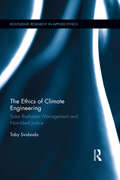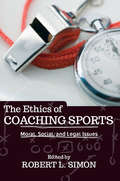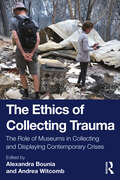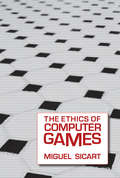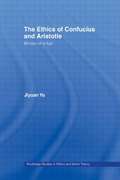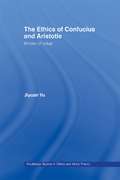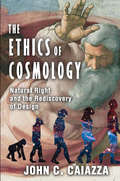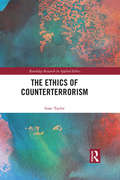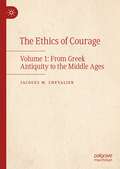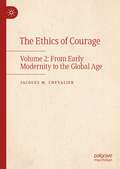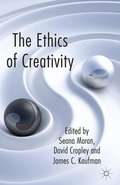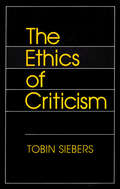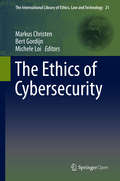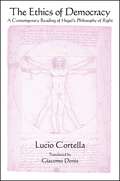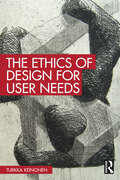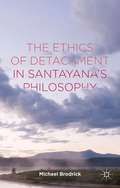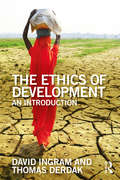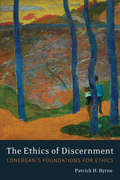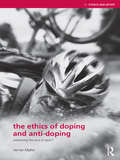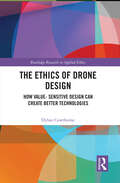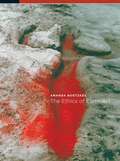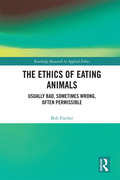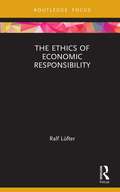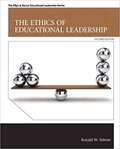- Table View
- List View
The Ethics of Climate Engineering: Solar Radiation Management and Non-Ideal Justice (Routledge Research in Applied Ethics)
by Toby SvobodaThis book analyzes major ethical issues surrounding the use of climate engineering, particularly solar radiation management (SRM) techniques, which have the potential to reduce some risks of anthropogenic climate change but also carry their own risks of harm and injustice. The book argues that we should approach the ethics of climate engineering via "non-ideal theory," which investigates what justice requires given the fact that many parties have failed to comply with their duty to mitigate greenhouse gas emissions. Specifically, it argues that climate justice should be approached comparatively, evaluating the relative justice or injustice of feasible policies under conditions that are likely to hold within relevant timeframes. Likely near-future conditions include "pessimistic scenarios," in which no available option avoids serious ethical problems. The book contends that certain uses of SRM can be ethically defensible in some pessimistic scenarios. This is the first book devoted to the many ethical issues surrounding climate engineering.
The Ethics of Coaching Sports: Moral, Social and Legal Issues
by Robert L. SimonThe Ethics of Coaching Sports features invited contributions written by prominent scholars examining a broad range of normative or evaluative issues that arise from the role of the coach in competitive sports. The collection is accessible and comprehensive, including discussion of concrete issues in coaching, such as the distribution of playing time, bullying, the implications of recent events surrounding the Pennsylvania State scandal, and Title IX and gender equity. The contributing authors also explore the larger ethical considerations of the role of the coach as educator, leader, and moral role model; special considerations when coaching children; and an examination of the failures of coaches to meet appropriate standards when they do not respect their players and their programs. Each contributor presents the main arguments and positions relevant to their chosen topic and, with the ground set, the authors then seek to advance the reader's theoretical and philosophical understanding of coaching. Robert L. Simon's introductions to each of the book's four parts help to summarize the main theses of the contributors' chapters and examine differences between how each author approaches their chosen subject.Study questions are also provided for each chapter, making The Ethics of Coaching Sports the perfect companion for classes on sports ethics and coaching.
The Ethics of Collecting Trauma: The Role of Museums in Collecting and Displaying Contemporary Crises
by Alexandra BouniaThe Ethics of Collecting Trauma offers an interdisciplinary dialogue on the ethics of contemporary museums that are involved in collecting moments of collective trauma.Including a range of international contributions, the volume explores the ethics of collecting material that documents contemporary traumatic events. The case studies focus on four categories of such events: forced migration; terrorism attacks; major natural disasters; and cultural traumas, such as the ongoing legacy of colonization. Contributors consider whether cultural institutions have a right to collect materials about these events and what kind of materials they should focus on, if so; who is being memorialized, who should hold the power to decide what is collected, and what the critical timeline for such initiatives is. The volume also considers what the larger purpose of such collecting is and how to deal with past collecting practices, arguing that museums need to consider, in a careful and deliberate way, their ethical responsibilities as cultural institutions.The Ethics of Collecting Trauma will be of interest to academics and students working in the areas of museum and heritage studies, cultural studies, trauma studies, memory studies, and migration studies. The book will also appeal to museum professionals working around the globe.
The Ethics of Computer Games
by Miguel SicartWhy computer games can be ethical, how players use their ethical values in gameplay, and the implications for game design. Despite the emergence of computer games as a dominant cultural industry (and the accompanying emergence of computer games as the subject of scholarly research), we know little or nothing about the ethics of computer games. Considerations of the morality of computer games seldom go beyond intermittent portrayals of them in the mass media as training devices for teenage serial killers. In this first scholarly exploration of the subject, Miguel Sicart addresses broader issues about the ethics of games, the ethics of playing the games, and the ethical responsibilities of game designers. He argues that computer games are ethical objects, that computer game players are ethical agents, and that the ethics of computer games should be seen as a complex network of responsibilities and moral duties. Players should not be considered passive amoral creatures; they reflect, relate, and create with ethical minds. The games they play are ethical systems, with rules that create gameworlds with values at play. Drawing on concepts from philosophy and game studies, Sicart proposes a framework for analyzing the ethics of computer games as both designed objects and player experiences. After presenting his core theoretical arguments and offering a general theory for understanding computer game ethics, Sicart offers case studies examining single-player games (using Bioshock as an example), multiplayer games (illustrated by Defcon), and online gameworlds (illustrated by World of Warcraft) from an ethical perspective. He explores issues raised by unethical content in computer games and its possible effect on players and offers a synthesis of design theory and ethics that could be used as both analytical tool and inspiration in the creation of ethical gameplay.
The Ethics of Confucius And Aristotle: Mirrors of Virtue
by Jiyuan YuFurthermore, this work focuses on singling out the most significant issues which not only are commonly exploited in these two ethics, but are also of great interest in contemporary virtue ethics. I first became interested in this subject in 1996 when Nicholas Bunnin invited me to speak at a conference on Chinese philosophy that he organized at Oxford University. By that time, Aristotle’s Nicomachean Ethics had been intensively studied as the most important model of virtue ethics for decades. As a student of Aristotle, when I turned my eyes to Chinese philosophy, the first thing I noticed is how similar the Confucian approach to ethics is to Aristotle’s in many aspects. Hence I chose to present a paper dealing with how Aristotle and Confucius conceive the conception of virtue. The paper was later published in the Philosophy East and West 48 (1998), with the title of ‘‘Virtue: Aristotle and Confucius.’’ It became the seed of this book.
The Ethics of Confucius and Aristotle: Mirrors of Virtue (Routledge Studies in Ethics and Moral Theory #7)
by Jiyuan YuAs a comparative study of the virtue ethics of Aristotle and Confucius, this book explores how they each reflect upon human good and virtue out of their respective cultural assumptions, conceptual frameworks, and philosophical perspectives. It does not simply take one side as a framework to understand the other; rather, it takes them as mirrors for each other and seeks to develop new readings and perspectives of both ethics that would be unattainable if each were studied on its own.
The Ethics of Cosmology: Natural Right and the Rediscovery of Design
by John C. CaiazzaWithin the last one hundred years, the scientific conception of the universe has undergone radical change. As a result a new field has evolved, called "cosmology," that examines the philosophical and scientific nature of the universe. Cosmology conceives of a material universe in which the interior of atoms do not act in the same predictable manner as the objects we can see and in which space is no longer empty volume unaffected by the matter within it. The universe is not a machine that operates with the same set of rules, but rather a living, growing organism.This new cosmology is forcing a consideration of the meaning of life that also calls for a reconsideration of moral law—the doctrine of natural right. Natural law theory is based on a cosmology that is grounded in classical metaphysics. John C. Caiazza uses the term "natural right" rather than "natural law" since his argument for cosmic teleology is based on the cosmology of contemporary science and not that of classical metaphysics. If evolution and development are the key to understanding nature, it is important to get the evolutionary concept of nature right, especially when it involves ethics.The universe can be viewed in two ways. One can admire the intricacy of the cosmological process on the physical, chemical, and astronomical levels. Or, one can look at this process as a result of design or providence. These two options should not preclude each other, Caiazza asserts; we should instead look closely at what science reveals about design. This volume offers an opportunity to reconcile the thinking of those who hold to traditional religious views on the origins of the universe and those who look to scientific explanations.
The Ethics of Counterterrorism (Routledge Research in Applied Ethics)
by Isaac TaylorStates across the globe spend billions of dollars fighting terrorism annually. As well as strategic questions about the way in which the money should be spent, we are also confronted with a host of moral issues here, many of which are poorly understood. The Ethics of Counterterrorism offers the first systematic normative theory for guiding, assessing, and criticising counterterrorist policy. Many commentators claim that state actors combating terrorism should set aside ordinary moral and legal frameworks, and instead bind themselves by a different (and, generally, more permissive) set of ethical rules than is appropriate in other areas. The book assesses arguments for this view, and more specifically investigates whether widely-endorsed restrictions on state action in the areas of surveillance, policing, armed conflict, criminal justice, diplomacy, and cultural integration need to be weakened when we are confronted with terrorist threats. With its novel overall framework for assessing counterterrorist strategies, its comprehensive analysis of existing practices, and its bringing the tools of analytic philosophy to bear on new questions regarding how states can fight terrorism both effectively and morally, The Ethics of Counterterrorism promises to be an important point of reference for future debates in this area.
The Ethics of Courage: Volume 1: From Greek Antiquity to the Middle Ages
by Jacques M. ChevalierThis two-volume work examines far-reaching debates on the concept of courage from Greek antiquity to the Christian and mediaeval periods, as well as the modern era. Volume 1 begins with Homeric poetry and the politics of fearless demi-gods thriving on war. The tales of lion-hearted Heracles, Achilles, and Ulysses, and their tragic fall at the hands of fate, eventually give way to classical views of courage based on competing theories of rational wisdom and truth. Fears of the enemy and anxieties about suffering and death are addressed through the lenses and teachings of medicine, geography, military history, moral philosophy, and metaphysics. For early Christian thinkers, the ethics of fear, fate, and fealty to the Almighty supplant the voice of reason and the wisdom of virtue. Much of Christian doctrine's history is a long journey towards bridging the gap between Greek philosophy and devotion to God and spirits in heaven. Some Church Fathers attempt to dispel the fear of suffering through a joyful craving for martyrdom and the eternal blessings that follow. Others show openness to one or more of the following principles: the abstractions of moral philosophy, the metaphysics of Gnostic enlightenment, the gift of free will and intentionality, the growth of church authority and hegemony, and the intrinsic worth of life on Earth. Augustine, Ambrose, Cassian, and Chrysostom play a central role in revisiting the foundations of Christian fortitude along some or all of these lines. They lay the groundwork for the scholastic adaptations of faith-based rationalism proposed by Peter Lombard, Philip the Chancellor, Albert the Great, and Thomas of Aquinas. The mediaeval period ends with church dissidents and Protestant Reform leaders condemning Rome’s corruption and calling for a return to early Christian faith and the courage of godly fear, submission, suffering, and fate.
The Ethics of Courage: Volume 2: From Early Modernity to the Global Age
by Jacques M. ChevalierThis two-volume work examines far-reaching debates on the concept of courage from Greek antiquity to the Christian and mediaeval periods, as well as the modern era. Volume 1 explains how competing accounts of epistêmê, rational wisdom, and truth dominated classical antiquity. Early Christian and mediaeval thinkers, in contrast, favoured fortitude founded on faith and fear of God over philosophical reasoning left to its own devices. Volume 2 turns to theories of courage from the early modern period to the present. It shows how the twin laws of polis and physis are at the heart of post-medieval thought. Courage is found at the crossroads of love and dread, freedom and fate, happiness and suffering, as well as power and submission to the ruling order. The later influence of evolutionism, existentialism, and the social and natural sciences on moral philosophy is also addressed at some length. The protection of people's best interests, the passions and powers of the human will, and the rule of active energy in all aspects of life supplant courage formerly viewed through the lens of reason or faith, or a combination of the two. These new ideas, paradoxically, herald the end of the ethics of courage. They also undermine the courage of ethical thinking. Courage is no longer an end in itself, nor is it a means to happiness "at the end." Regardless of what Gandhi, Tillich, and Foucault have to say about the topic, late modernity and the global age witness a marked loss of interest in courage as an idea worthy of conceptual investigation. Debates about the moral implications of courage give way to the value-free science of resilience, which studies how people can recover from past trauma and find wellness, primarily in the realm of physis.
The Ethics of Creativity
by James C. Kaufman Seana Moran David CropleyThe Ethics of Creativity illuminates the thorny issues that arise when novel creative ideas collide with what we believe to be 'right' or 'good'. This book tackles questions of when creativity and ethics tend to coincide and when conflict, and how both might be harnessed to support a brighter future for all.
The Ethics of Criticism
by Tobin SiebersTobin Siebers asserts that literary criticism is essentially a form of ethics. The Ethics of Criticism investigates the moral character of contemporary literary theory, assessing a wide range of theoretical approaches in terms of both the ethical presuppositions underlying the critical claims and the attitudes fostered by the approaches. Building on analyses of the moral legacies of Plato, Kant, Nietzsche, and Freud, Siebers identifies the various fronts on which the concerns of critical theory impinge on those of ethics.
The Ethics of Cybersecurity (The International Library of Ethics, Law and Technology #21)
by Markus Christen Bert Gordijn Michele LoiThis open access book provides the first comprehensive collection of papers that provide an integrative view on cybersecurity. It discusses theories, problems and solutions on the relevant ethical issues involved. This work is sorely needed in a world where cybersecurity has become indispensable to protect trust and confidence in the digital infrastructure whilst respecting fundamental values like equality, fairness, freedom, or privacy. The book has a strong practical focus as it includes case studies outlining ethical issues in cybersecurity and presenting guidelines and other measures to tackle those issues. It is thus not only relevant for academics but also for practitioners in cybersecurity such as providers of security software, governmental CERTs or Chief Security Officers in companies.
The Ethics of Democracy: A Contemporary Reading of Hegel's Philosophy of Right (SUNY series in Contemporary Italian Philosophy)
by Lucio CortellaThe legal regulations and formal rules of democracy alone are not enough to hold a society together and govern its processes. Yet the irreducible ethical pluralism that characterizes contemporary society seems to make it impossible to impose a single system of values as a source of social cohesion and identity reference. In this book, Lucio Cortella argues that Hegel's theory of ethical life can provide such a grounding and makes the case through an analysis of Hegel's central political work, the Philosophy of Right. Although Hegel did not support democratic political ends and wrote in a historical and cultural context far removed from the current liberal-democratic scene, Cortella maintains that the Hegelian theory of ethical life, with its emphasis on securing a framework conducive to human freedom, nevertheless offers a convincing response to the problem of the ethical uprootedness of contemporary democracy.
The Ethics of Design for User Needs
by Turkka KeinonenThis book offers an inquiry into the ethics of ‘human needs capture’ for design purposes by drawing upon ethical theories and narratives. Designers have historically relied upon the satisfaction of human needs as a moral justification for their profession. This volume offers an alternative critique to challenge this perspective, arguing that seeking to satisfy needs doesn't offer sufficient moral justification on its own. It presents an extensive ethical analysis of the notion of need and develops a thought-provoking case for a plural reconceptualisation of the notion of ‘need’ as user-based knowledge about product and service improvement opportunities. It does this by drawing upon a range of ethical approaches including Soran Reader’s needs ethics, classical utilitarianism, Robert Nozick’s libertarian philosophy, and John Rawls’ theory of justice. The book goes on to link these approaches to concepts guiding design such as human-centred design, collaborative design, and end user innovation. Written as a dialogue between a designer and his consciousness, the book underlines the deliberative nature of applied design ethics, and also highlights how consciousness challenges designers to solve their moral dilemmas. This engaging format invites readers to become an intimate part of the ‘discussion’. This book will be of interest to students and academics studying product design, industrial design, interaction design, user experience design, design ethics, and sustainable development.
The Ethics of Detachment in Santayana’s Philosophy
by Michael BrodrickGerman philosopher Arthur Schopenhauer wrote in 1818 that true happiness is impossible without inner peace. Around a hundred years later, after studying Schopenhauer, American philosopher George Santayana explained in detail how we can achieve inner peace through a special activity he called 'spirituality'. While Santayana's theory of spirituality is not well known today, it holds great promise for improving our lives. A form of momentary detachment from ideals and values, spirituality frees us to enjoy what there is, without judging it. Brodrick clarifies and completes Santayana's account of spirituality, while suggesting how spirituality can relieve human suffering, enrich our daily lives, and even make us better human beings. The finitude of the world and our own finitude mean that nothing in this life will ever be perfect, but spirituality reveals that, in a sense, everything is good enough as it is.
The Ethics of Development: An Introduction (The Ethics of ...)
by David Ingram Thomas J DerdakThe Ethics of Development: An Introduction systematically and comprehensively examines the ethical issues surrounding the concept of development. The book addresses important questions such as: What does development mean? Is there a human right to development? If we aim for sustainable development in an age of global climate change, should developed nations sacrifice economic growth for the sake of allowing developing countries to catch up? Should eradication of poverty or diminution of radical inequality be the principal focus of developmental policy? What are the macroeconomic theories of development? And how have they informed development policy? How does development work in practice? Featuring case studies throughout, this textbook provides a philosophical introduction to an incredibly topical issue studied by students within the fields of applied ethics, global justice, economics, politics, sociology, and public policy.
The Ethics of Discernment
by Patrick H. ByrneIn The Ethics of Discernment, Patrick H. Byrne presents an approach to ethics that builds upon the cognitional theory and the philosophical method of self-appropriation that Bernard Lonergan introduced in his book Insight, as well as upon Lonergan's later writing on ethics and values.Extending Lonergan's method into the realm of ethics, Byrne argues that we can use self-appropriation to come to objective judgements of value. The Ethics of Discernment is an introspective analysis of that process, in which sustained ethical inquiry and attentiveness to feelings as "intentions of value" leads to a rich conception of the good.Written both for those with an interest in Lonergan's philosophy and for those interested in theories of ethics who have only a limited knowledge of Lonergan's work, Byrne's book is the first detailed exposition of an ethical theory based on Lonergan's philosophical method.
The Ethics of Doping and Anti-Doping: Redeeming the Soul of Sport? (Ethics and Sport)
by Verner MøllerWith every positive drugs test the credibility and veracity of modern elite sport is diminished. In this radical and provocative critique of current anti-doping policy and practice, Verner Møller argues that the fight against doping – promoted as an initiative to cleanse sport of cheats – is at heart nothing less than a battle to save sport from itself, located on the fault-line between the will to purity and the will to win. Drawing on extensive and detailed case studies of doping in sport, and using a highly original blend of conceptual ideas from philosophy and sociology, Møller strongly criticises current anti-doping regimes and challenges our commonly held ideas about the nature of sport and the risks posed by drugs to health and fair play. He argues forcefully that we must understand the precarious position of the athlete and that only by containing coaches, doctors and drug companies within the anti-doping regime can we hope to ever make progress on this most important issue. Written in a lively and engaging style, and skilfully blending empirical case studies with cutting edge theory, this book represents an important statement on the nature of sport, morality and modernity. It is important reading for all serious students and scholars of the ethics, sociology and politics of sport.
The Ethics of Drone Design: How Value-Sensitive Design Can Create Better Technologies (Routledge Research in Applied Ethics)
by Dylan CawthorneThis book presents a holistic approach to the design and use of drones. It argues that this powerful technology requires high levels of ethical analysis and responsibility – our moral progress must keep pace with our technological progress. Drone technologies support and diminish the flourishing of certain human values, impact power relations between individuals and groups, and add an additional element to the complex network of humans and objects in modern society. The book begins by introducing four prototype drones designed and built by the author: the healthcare drone, the search and rescue drone, the educational drone, and the spiritual drone. These drones have been developed using a value-sensitive design approach – with values such as human welfare, privacy, trust, environmental sustainability, and justice at the forefront. Ethical analyses and social impacts are taken as design inputs, leading to the creation of better, more responsible drone designs. The book then showcases additional methods used to develop the prototype drones from the fields of engineering, ethics, and art, including ethical frameworks, ethics standards, capability caution, and speculative design. The holistic approach reveals a more subtle and nuanced view of drones than the currently polarized characterization of "the good drone" or "the killer drone". The book concludes with recommendations for drone engineers, companies, lawmakers, and citizens on how to support ethics in drone design. The Ethics of Drone Design is an essential resource for scholars, advanced students, engineers, and designers interested in the ethics of technology.
The Ethics of Drone Design: How Value-Sensitive Design Can Create Better Technologies (Routledge Research in Applied Ethics)
by Dylan CawthorneThis book presents a holistic approach to the design and use of drones. It argues that this powerful technology requires high levels of ethical analysis and responsibility – our moral progress must keep pace with our technological progress. Drone technologies support and diminish the flourishing of certain human values, impact power relations between individuals and groups, and add an additional element to the complex network of humans and objects in modern society. The book begins by introducing four prototype drones designed and built by the author: the healthcare drone, the search and rescue drone, the educational drone, and the spiritual drone. These drones have been developed using a value-sensitive design approach – with values such as human welfare, privacy, trust, environmental sustainability, and justice at the forefront. Ethical analyses and social impacts are taken as design inputs, leading to the creation of better, more responsible drone designs. The book then showcases additional methods used to develop the prototype drones from the fields of engineering, ethics, and art, including ethical frameworks, ethics standards, capability caution, and speculative design. The holistic approach reveals a more subtle and nuanced view of drones than the currently polarized characterization of "the good drone" or "the killer drone". The book concludes with recommendations for drone engineers, companies, lawmakers, and citizens on how to support ethics in drone design. The Ethics of Drone Design is an essential resource for scholars, advanced students, engineers, and designers interested in the ethics of technology.
The Ethics of Earth Art
by Amanda BoetzkesSince its inception in the 1960s, the earth art movement has sought to make visible the elusive presence of nature. Though most often associated with monumental land-based sculptures, earth art encompasses a wide range of media, from sculpture, body art performances, and installations to photographic interventions, public protest art, and community projects. In The Ethics of Earth Art, Amanda Boetzkes analyzes the development of the earth art movement, arguing that such diverse artists as Robert Smithson, Ana Mendieta, James Turrell, Jackie Brookner, Olafur Eliasson, Basia Irland, and Ichi Ikeda are connected through their elucidation of the earth as a domain of ethical concern. Boetzkes contends that in basing their works&’ relationship to the natural world on receptivity rather than representation, earth artists take an ethical stance that counters both the instrumental view that seeks to master nature and the Romantic view that posits a return to a mythical state of unencumbered continuity with nature. By incorporating receptive surfaces into their work—film footage of glaring sunlight, an aperture in a chamber that opens to the sky, or a porous armature on which vegetation grows—earth artists articulate the dilemma of representation that nature presents. Revealing the fundamental difference between the human world and the earth, Boetzkes shows that earth art mediates the sensations of nature while allowing nature itself to remain irreducible to human signification.
The Ethics of Eating Animals: Usually Bad, Sometimes Wrong, Often Permissible (Routledge Research in Applied Ethics)
by Bob FischerIntensive animal agriculture wrongs many, many animals. Philosophers have argued, on this basis, that most people in wealthy Western contexts are morally obligated to avoid animal products. This book explains why the author thinks that’s mistaken. He reaches this negative conclusion by contending that the major arguments for veganism fail: they don’t establish the right sort of connection between producing and eating animal-based foods. Moreover, if they didn’t have this problem, then they would have other ones: we wouldn’t be obliged to abstain from all animal products, but to eat strange things instead—e.g., roadkill, insects, and things left in dumpsters. On his view, although we have a collective obligation not to farm animals, there is no specific diet that most individuals ought to have. Nevertheless, he does think that some people are obligated to be vegans, but that’s because they’ve joined a movement, or formed a practical identity, that requires that sacrifice. This book argues that there are good reasons to make such a move, albeit not ones strong enough to show that everyone must do likewise.
The Ethics of Economic Responsibility (Economics and Humanities)
by Ralf LüfterThe Ethics of Economic Responsibility raises fundamental ethical questions related to the conceptualization of economic responsibility, that is: the imperative to fulfil certain economic obligations. It builds on a basic characterization of the question of ethics in order to introduce responsibility as a constitutive element for a new determination of economic knowledge. Drawing on the metaphysical tradition of philosophy, the book explores the distinction between "operability-based-responsibility" and "end-in-itself-based responsibility" and also considers what is tentatively called "being-related responsibility". By presenting these arguments about the notion of economic responsibility, the book contributes to the growing calls for ethical questions to not be merely complementary to the ongoing discourse of economic sciences, but rather to sit at its core, in such a way as to restore the intrinsic ethical dimension of economics itself. The book marks a significant contribution to the literature on the philosophy of economics, applied ethics more broadly, and the critical discourse concerning mainstream economics.
The Ethics of Educational Leadership
by Ronald ReboreIn The Ethics of Educational Leadership, the author of one of the leading texts in human resource administration presents a practical resource dealing with significant ethical issues involved in building and central office administration. In it, Ronald Rebore presents the ethical ideas and notions of 20 philosophers and psychologists applied to the practice of educational leadership. <p><p> The book helps tomorrow’s educational leaders evaluate the philosophical ideas of others, and use what they discover to develop their own way of approaching their leadership responsibilities.
